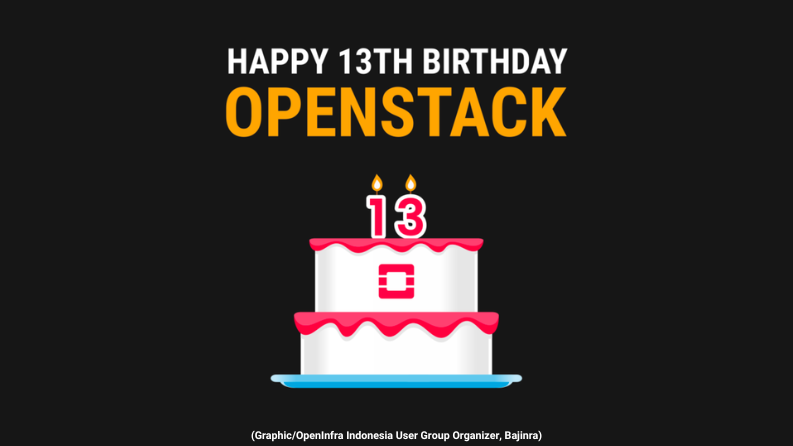OpenStack is turning 13 this month, so now is a good time to reflect back on the past and look at what comes next.
When OpenStack started in 2010, the term “open source” had just been invented 12 years ago. Ubuntu was six years old. Android, now present in most pockets, had just turned two. Those were the middle ages of open source as we know it today. In those years, most open source projects were started under the control of a single entity and developed in a controlled manner. Software used for providing infrastructure was very proprietary, with VMWare enjoying a monopoly in private infrastructure and AWS enjoying very little competition in the public infrastructure space.
That is when a group of open source enthusiasts gathered around the idea of making an openly-developed cloud infrastructure solution, one that could be used for private or public infrastructure alike. It would avoid the ills of the middle age of open source by following the four opens: open source obviously, but also openly-developed using transparent and accessible tooling, openly-designed within events inclusive of all opinions, and openly-governed with contributors fully in control of the project. We convinced Rackspace to release the nascent Swift under the Apache-2 license, we rallied NASA to join with their NovaCC prototype, and off we went.
OpenStack took the world by storm. Everyone jumped on the train, and the early kernel of open source enthusiasts was soon joined by troves of start-up entrepreneurs and contributors from large companies, either building a product based on OpenStack or just making sure their products played nice with it. The scope increased as OpenStack promised to fix all the problems that anyone would ever encounter. Too fast, too far, maybe. What was OpenStack? Was it an all-in-one solution for developers looking at leveraging programmable infrastructure in their applications? Or a solution for infrastructure providers to provide base resources to those developers?
The rise of Kubernetes clarified that: OpenStack would primarily be an open source solution to provide base infrastructure resources (compute, storage and networking) to application deployers, or application deployment frameworks like Kubernetes. With that clarification, the scope contracted a bit, winners and losers in the market emerged. OpenStack would be the de-facto open source standard for providing infrastructure. Not more, but also not less. Today, OpenStack is extremely stable, with development work mostly focused on enabling at the software layer new features appearing in hardware, much like it is what drives most of the Linux kernel development these days. The enthusiasts and the pioneers have made room for settlers. And usage is growing more than ever.
Looking back, the real revolution that OpenStack started is the open infrastructure revolution. It proved that it was possible to collaboratively develop open source software for providing infrastructure. It made Kubernetes and other following projects possible. And the result shows: it is now possible to provide infrastructure fully using open source solutions, using the LOKI stack: Linux, OpenStack, Kubernetes, Infrastructure. With digital sovereignty concerns rising at the national or corporate level, there is more demand than ever for open infrastructure. It is very likely that future infrastructure software will be developed following the four opens that OpenStack pioneered.
Where will OpenStack be in 13 years? Much like the Linux kernel, I expect OpenStack to still be around, providing the much-needed layer between hardware and programmable APIs, for higher-level development frameworks to build upon. I expect those higher-level frameworks to evolve, as new technologies appear and developers flock to that newest exciting world. But the infrastructure provider role is here to stay, and we’ll always want an open source way of doing that, and OpenStack will always be there to provide that base layer.
Happy 13th anniversary, OpenStack! See you at 26.
- Thirteen Years of OpenStack - July 19, 2023
- Why You Should Join Me at the OpenInfra Summit - May 1, 2023
- 2021 OpenInfra Annual Report: State of OpenInfra - January 26, 2022

)







